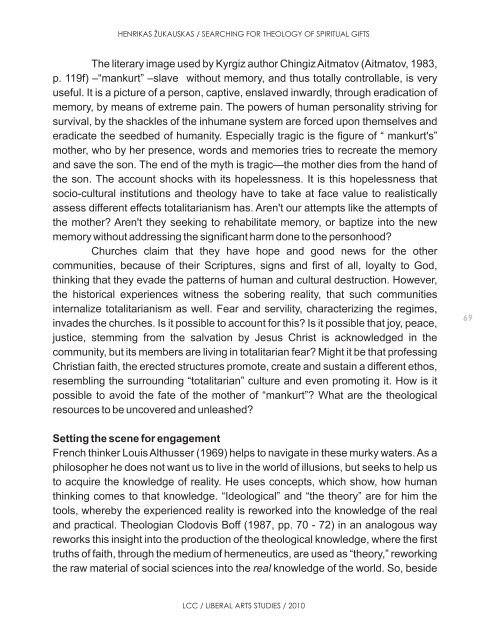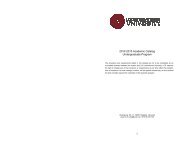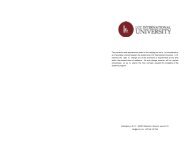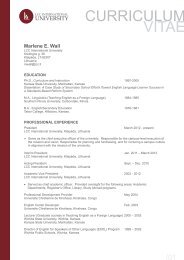lcc liberal arts studies / 2010 volume iii - LCC International University
lcc liberal arts studies / 2010 volume iii - LCC International University
lcc liberal arts studies / 2010 volume iii - LCC International University
Create successful ePaper yourself
Turn your PDF publications into a flip-book with our unique Google optimized e-Paper software.
HENRIKAS ÞUKAUSKAS / SEARCHING FOR THEOLOGY OF SPIRITUAL GIFTS<br />
The literary image used by Kyrgiz author Chingiz Aitmatov (Aitmatov, 1983,<br />
p. 119f) –“mankurt” –slave without memory, and thus totally controllable, is very<br />
useful. It is a picture of a person, captive, enslaved inwardly, through eradication of<br />
memory, by means of extreme pain. The powers of human personality striving for<br />
survival, by the shackles of the inhumane system are forced upon themselves and<br />
eradicate the seedbed of humanity. Especially tragic is the figure of “ mankurt's”<br />
mother, who by her presence, words and memories tries to recreate the memory<br />
and save the son. The end of the myth is tragic—the mother dies from the hand of<br />
the son. The account shocks with its hopelessness. It is this hopelessness that<br />
socio-cultural institutions and theology have to take at face value to realistically<br />
assess different effects totalitarianism has. Aren't our attempts like the attempts of<br />
the mother? Aren't they seeking to rehabilitate memory, or baptize into the new<br />
memory without addressing the significant harm done to the personhood?<br />
Churches claim that they have hope and good news for the other<br />
communities, because of their Scriptures, signs and first of all, loyalty to God,<br />
thinking that they evade the patterns of human and cultural destruction. However,<br />
the historical experiences witness the sobering reality, that such communities<br />
internalize totalitarianism as well. Fear and servility, characterizing the regimes,<br />
invades the churches. Is it possible to account for this? Is it possible that joy, peace,<br />
justice, stemming from the salvation by Jesus Christ is acknowledged in the<br />
community, but its members are living in totalitarian fear? Might it be that professing<br />
Christian faith, the erected structures promote, create and sustain a different ethos,<br />
resembling the surrounding “totalitarian” culture and even promoting it. How is it<br />
possible to avoid the fate of the mother of “mankurt”? What are the theological<br />
resources to be uncovered and unleashed?<br />
Setting the scene for engagement<br />
French thinker Louis Althusser (1969) helps to navigate in these murky waters. As a<br />
philosopher he does not want us to live in the world of illusions, but seeks to help us<br />
to acquire the knowledge of reality. He uses concepts, which show, how human<br />
thinking comes to that knowledge. “Ideological” and “the theory” are for him the<br />
tools, whereby the experienced reality is reworked into the knowledge of the real<br />
and practical. Theologian Clodovis Boff (1987, pp. 70 - 72) in an analogous way<br />
reworks this insight into the production of the theological knowledge, where the first<br />
truths of faith, through the medium of hermeneutics, are used as “theory,” reworking<br />
the raw material of social sciences into the real knowledge of the world. So, beside<br />
<strong>LCC</strong> / LIBERAL ARTS STUDIES / <strong>2010</strong><br />
69






